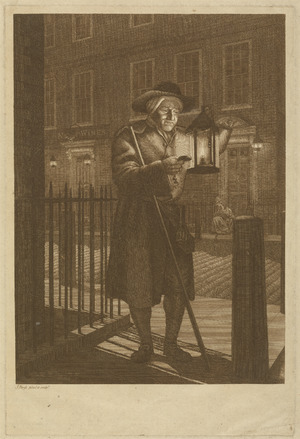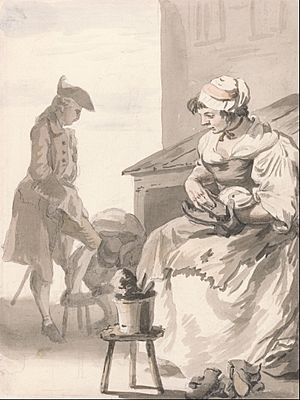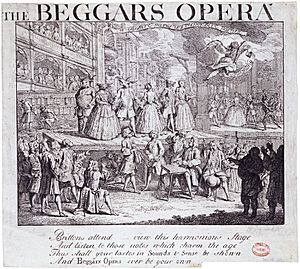Second Thoughts Are Best facts for kids
| Author | Daniel Defoe |
|---|---|
| Original title | Second Thoughts Are Best: or, a Further Improvement of a Late Scheme to Prevent Street Robberies |
| Country | United Kingdom |
| Language | English |
| Genre | Pamphlet |
| Publisher | W. Meadows |
|
Publication date
|
October 8, 1729 |
Second Thoughts Are Best is a short book, called a pamphlet, written in 1729 by Daniel Defoe. He used the pen name Andrew Moreton Esq.. Moreton was presented as an older, middle-class man. He was very worried about the rise in crime in the 1720s.
Like in his other writings, Moreton looked at many social problems. These included more street robberies and ineffective night watchmen. He also wrote about places selling alcohol and many beggars in London. Moreton wanted to stop street robbers completely. He offered ideas to improve the night watch, people's manners, and even the theatre. He believed these changes would make life better for everyone.
Defoe often used different names when he wrote. This made him known as a writer who could change his style easily. These different names let him share his thoughts freely. He wrote about London's social life, sometimes with a bit of humor. He also showed a strong sense of duty. This was seen as important for English citizens in the 1700s.
Contents
About the Book
A Message to the King
This pamphlet was written for King George II and his Queen, Caroline. Copies were also given to important leaders in the government. Defoe greatly admired the royal family. He saw King George as a leader who truly cared for his people. Defoe's ideas for improving society were becoming very popular at this time.
In the introduction, Moreton did more than just praise the King. He also used it to share his concerns. He wanted to make sure his ideas were heard. He also felt that some people had copied his earlier plans. He wanted to make it clear that his new ideas were for the good of everyone. He knew some people might not like his suggestions.
The Night Watch
Old and Tired Watchmen
One big problem Moreton wrote about was the night watch. This group was very important in London in the 1700s. Moreton described watchmen as "decrepit, superannuated wretches." This means they were old and worn out. He felt they were too old to patrol the streets. He thought they were more suited for a poor house.
Moreton believed these watchmen were not scary to criminals. He even thought some might join criminals due to their low pay. Many people at the time felt London was unsafe. There were many street robberies and house break-ins. These crimes made everyone in the city worried. Even wealthy areas were affected by house break-ins.
London's streets were also changing. Shops, places to eat, and theatres stayed open late. Many people were out after dark. This made it harder for watchmen to keep the streets safe.
How the Watch Worked
In the early 1700s, the night watchman was an old idea. It started in 1285. People believed citizens should help keep society safe. So, each London neighborhood asked its homeowners to take turns on watch duty. They did this for free, from sunset to sunrise. They only had a stick or a halberd (a type of spear) for protection.
Each watchman had a small area to patrol every hour. They checked suspicious people from their watch box. This duty took a lot of time and effort. By the late 1600s, people started paying others to do their watch duty. Often, these paid watchmen were old men. They took the job because they had few other options. This was sometimes an alternative to getting help from the poor law.
Moreton also suggested that money collected for the watch was sometimes misused. Constables and beadles collected fees for the night watch. They were often accused of spending little on watchmen. They would then keep the extra money for themselves.
A Need for Change
Moreton suggested a practical plan for a better night watch. This plan was already used in some areas. He said watchmen should be "stout able-bodied men." There should be enough of them, about one for every forty houses. This is because a watchman cannot see clearly beyond twenty houses.
To stop money from being misused, Moreton had an idea. He suggested that homeowners should choose and pay the watchmen themselves. This would be done through a special tax system. He also thought watchmen should earn more money, about 20 pounds a year. This would allow a poor man to "live decently."
Watchmen should also have proper weapons, like firearms and swords. This would help them stop crime and protect themselves. They should also have a lantern and a horn to sound an alarm.
Today, some experts believe watchmen were actually good at catching criminals. Their work might not always be recorded officially. Records from the Old Bailey court show many watchmen were brave. They often caught offenders. The reward for catching a robber or burglar was a good reason to do their job well. They could also get private tips.
However, Moreton was unsure about watchmen's honesty. He thought some might be too close to criminals. Watchmen sometimes even faced trials for crimes like murder or theft.
Improving Society
Servants
Servants were seen as a hidden danger in London in the 1700s. Many servants were accused of theft. London was a big city where young people came to find work. Most became servants or apprentices. Defoe listed many types of servants. These included shop workers, cooks, and even clerks.
Moreton believed servants should be loyal to their employers. He thought they should be like adopted children. On the other hand, masters and mistresses also had duties. They should make sure servants kept good hours. Many servants were "ruined by junketing and staying out."
The city's temptations could easily lead a good servant to crime. People worried about servants who took jobs just to steal. They feared servants might let criminals into the house at night. Defoe felt that living in fear of servants made England seem unsafe. He wanted England to be a thriving country.
Soldiers and Sailors
When wars ended, many soldiers and sailors lost their jobs. They would wander London's streets without work or a place to live. This often led to more violent crimes during peacetime. It was hard to find a job in post-war London. Crime rates for robbery and property theft went up sharply.
Sailors could sometimes find work on merchant ships. But soldiers had fewer options. Cavalrymen could even keep their horses after leaving the army. With their weapon skills and criminal friends, they could easily form gangs.
Moreton had a clever idea for this problem. He suggested keeping an eye on soldiers' living places, even after wars. "Surveyors" would check if soldiers were home at certain times. If they were absent, they would be punished. He also suggested hiring soldiers and sailors. They could patrol the streets on horses and on foot. They could also keep records of goods leaving and arriving. This extra pay might stop them from becoming criminals.
Hackney Coach Drivers
Hackney coach drivers were often criticized. Moreton called them "the scum of the people." He said they often robbed customers. They were also sometimes working with highway robbers. Traveling by hackney coach could be dangerous. Drivers would often change routes and prices to earn more money.
Drivers were so rude that a law was passed in 1682. It aimed to control their numbers and set fair prices. It also set places where they could wait for customers. Moreton pointed out a problem with the law. The person who rented the coach was rarely the driver. So, the driver could just disappear, and the owner would not be punished.
Moreton believed the law needed to change. Both the driver and the owner should be held responsible for bad behavior. The owner should also have to register the driver. They should be responsible for the driver's actions.
Beggars and Vagrants
Beggars and vagrants were common on London streets. The term "beggar" included not just the very poor. It also meant anyone who asked for money or offered a service. This included shoe cleaners, linkboys (who carried torches at night), and chimney sweeps. Begging was seen as an art. How you looked, spoke, and told your story mattered.
Moreton saw beggars as potential criminals. He said they "lounge about all day, to see where they can steal at night." He wanted to stop shoe cleaners and link-boys. He saw them as "thieves with lights." Shoe cleaning was a common job. It let people approach others without getting into trouble.
Many lawmakers wanted to imprison beggars. But some begging was still allowed. Many people, especially women with children, could beg without being bothered.
Moreton also cared about honest poor people. He suggested building "barracks or barns" at the edges of town. All vagrants would have to go there at a certain time. They would get clean straw and be kept safe. If they had a way to earn an honest living, they could leave. Otherwise, they would be sent to a workhouse. This idea shows how people felt about the poor. They wanted to control them but also help them.
Changing Manners and Values
Moreton believed rising crime came from changes in English society. He felt people were becoming too greedy. He thought a love for luxury and short-sightedness led to more crime. He blamed "our effeminacy, our toupee wigs, and powdered pates." This greed was not just in rich people. Poor people also wanted to climb the social ladder. Defoe wrote about these ideas in other works too.
Moreton also showed how a few greedy people could hurt everyone. He criticized bakers, coal merchants, and butchers. He said they raised prices too much. This meant "the poor must pay for the wine." When people could not support their families, they became desperate. They might "turn rogues."
Moreton suggested the government should control these businesses. He hoped the government would "make them honest, even against their will." He also wanted people to make goods at home. This would help national trade and English craftsmanship.
In the late 1600s and early 1700s, people worried about bad behavior. They felt society was getting worse. Greed, laziness, and crime seemed linked. Many people, including Defoe, believed that crime came from weaker social values. Groups formed to improve manners. They had paid agents working in local areas.
Improving the Streets
Street Lighting
Moreton also looked at practical ways to improve London. He thought the street lighting was not good enough. He wanted the city to be "strongly guarded, and so gloriously illuminated." He suggested that:
a convenient number of lamps be set up, and those not of the convex kind, which blind the eyes, and are of no manner of use; they dazzle, but give no distinct light, and further, rather than prevent robberies. Many persons, deceived and blinded by these ignes fatui, have been run over by coaches, carts, &c., people stumbling more, even under these very lamps, than in the dark. In short, they are most unprofitable lights, and, in my opinion, rather abuses than benefits.
In the 1600s and early 1700s, London's lighting changed. Lamps with convex lenses were used. These lenses focused the light. They lit up more of the street than old candles. But they made such a strong beam that they could blind people. This made it hard to see dangers nearby. Moreton saw this as a real risk for citizens. He also thought it helped criminals.
A new lighting law was passed in 1736. It brought in new oil lamps that gave better light. Lamps on main streets were placed closer together. People liked these changes. Court records from the Old Bailey show that victims could identify criminals better because of improved street lighting.
Making Streets Safer
Moreton believed that the way streets were built mattered. He said that "all by-turnings, courts, alleys, lanes, &c., which may favour a street-robber's escape." London criminals had many ways to get away. As Henry Fielding wrote in 1751, London seemed designed for hiding. He called it "a vast Wood or Forest" for thieves. Defoe's stories also showed that the city had many hidden corners.
Defoe was fascinated by London. He saw two Londons: the busy one with shops and workers, and the dark one with thieves and poor children hiding in shadows.
Changing the Theatre
In his writings, Andrew Moreton often criticized the theatre. He especially disliked The Beggar's Opera (1728) by John Gay. He felt it made "thieves ... so amiable." This meant it made criminals seem good. He thought it taught people to be proud of being criminals. Moreton also criticized The Quaker's Opera, which was similar.
He stressed how these plays could affect people. He worried that "many unwary persons" would become criminals. They might be charmed by how criminals looked on stage. They might want to be like characters such as Macheath. Many critics at the time agreed. They blamed The Beggar's Opera for a rise in street crime.
In the mid-1700s, highwaymen were strangely popular. People were curious about them. They would visit Newgate prison just to see them. Famous robbers like Jack Sheppard became legends. Daniel Defoe himself was interested in these criminals. He wrote about Jack Sheppard in 1724. He showed him as a clever criminal. Defoe liked stories with witty tricks. His fictional works, like Moll Flanders, often showed this.
However, when Defoe wrote about social problems, he offered clear solutions. He believed the theatre should be reformed. He said "nothing exhibited but what might be represented before a bishop." He suggested a play called The Provoked Husband (1728). This play was very successful. It showed a wife who spent too much and gambled. But in the end, she changed her ways. This change is similar to what happens in Defoe's own stories.
 | Ernest Everett Just |
 | Mary Jackson |
 | Emmett Chappelle |
 | Marie Maynard Daly |




